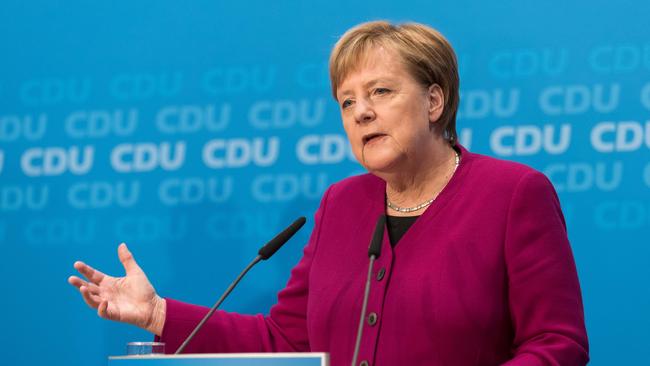MPs jostle for position after Merkel quits CDU leadership
Angela Merkel’s resignation as leader of the Christian Democrats will plunge the party into a month of campaigning.

German Chancellor Angela Merkel’s announcement she will stand down as leader of the Christian Democrats is set to plunge the party into a month of campaigning as a handful of candidates jostle for numbers to become the new chief.
Mrs Merkel, who will stay chancellor until the next general election in 2021, could work alongside her loyalists, the CDU secretary Annegret Kramp-Karrenbauer, Armin Laschet, the state premier in North Rhine-Westphalia or Economy Minister Peter Altmaier.
But her ability to install someone in her own mould is not a given. Her diminishing influence was exposed when ally Volker Kauder recently lost a vote to head the CDU parliamentary group.
If one of Mrs Merkel’s critics such as Friedrich Merz, 62, or 38-year-old Health Minister Jens Spahn is elected leader, realigning the party to a more conservative stance, she is unlikely to stay as chancellor for the full term.
If she does, there is a risk of her being a lame duck even though the current political set-up allows her to cling, ever weaker, to power.
Throughout her career, Mrs Merkel has defied her opponents, manoeuvring through difficulties with an instinct for consensus.
Even her surprise announcement that she would stand down as the leader of her party, the Christian Democrats (CDU) during the party conference in December yet to retain the key role of chancellor running the country until 2021, was an exercise in concession-making.
But Mrs Merkel, 64, is wounded from a series of political results that have crushed the party. Voters have fled to the Greens and their centre-left policies or the Alternative for Germany and its far-right anti-migration stance.
She is in retreat and her political rivals have already stepped up, some to try to finish her off.
On Monday, Mrs Merkel said her move was risky but insisted she could work with anyone, confounding her previous insistence, as late as last month, that the position of chancellor and party leader had to be combined.
“Today, it’s time to begin a new chapter,” Mrs Merkel said. “The government’s image is unacceptable. I do know this hasn’t been done before. It is unprecedented, but I believe it offers far more opportunities than risks for the country, for the German government and for my party.’’
But Mrs Merkel is playing on her biggest asset: fear. Party members of the CDU and the Bavarian sister party CSU are wary of being caned in a fresh general election that would be sparked by a Merkel resignation or if the increasingly fragile ruling coalition split.
The CDU/CSU union used to attract 40 to 50 per cent of the vote, but the last poll shows its support crashing down to 25 per cent, weakened by fractious negotiations trying to pull together a ruling coalition. However, having been elected Germany’s first female chancellor in 2005, Mrs Merkel, a physicist, may find it more difficult to complete her fourth term in office than she expects.
Coalition partners the Social Democrats may not oblige Mrs Merkel particularly as the Left of the party are agitating that it can rejuvenate its dwindling support base in opposition and wants a party summit brought forward to vote on the issue. If this coalition collapses it is unlikely another can be formed.
Bundestag president Wolfgang Schauble told German television: “Once elected as chancellor, you can only be thrown out without your own agreement if there is a majority in parliament who elects another chancellor. That’s unthinkable in this parliament. So her position is constitutionally strong.”
Mrs Merkel’s demise has rocked the EU, particularly in France, where President Emmanuel Macron has been relying on German support for his grand European vision. But countries like Italy, angry at having a huge migration burden, fuelled by Mrs Merkel’s open-door policies and Hungary, which rejected her plan to distribute migrants around the EU bloc, will welcome a change in leadership.
Polish Foreign Minister Jacek Czaputowicz echoed the view of most EU countries, supporting Mrs Merkel staying as chancellor because it would stabilise the EU.



